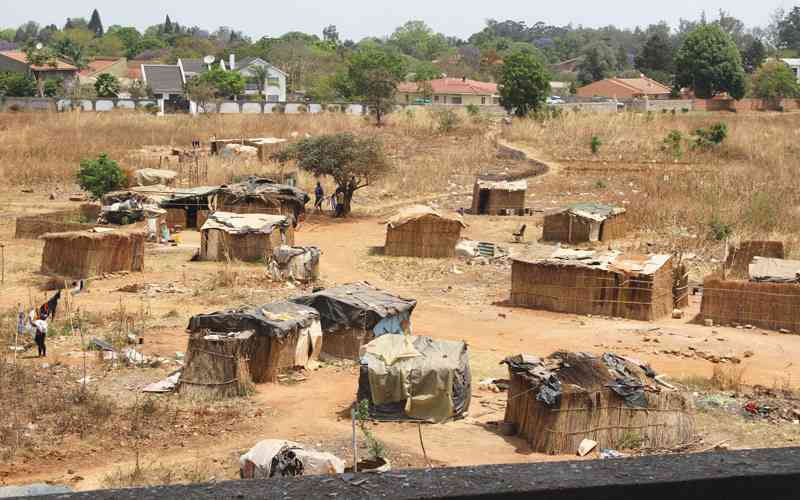
ABOUT five years ago, Daniel Chihwayi had a place he called home. It was a one-room lodging in Matapi flats in Mbare, a high-density suburb south of Harare, which he shared with his wife and three daughters. It wasn’t the best living arrangement. It was too small for his family, and the general living conditions were squalid. But it’s what he could afford, costing him about US$20 a month in rentals.
But in 2018, a fire gutted the entire flat, leaving Chihwayi and other families out in the cold. As a temporary solution, the then area councillor housed them in a run-down workshop opposite the ruins of what used to be their flat, promising them a more permanent solution. Today, Chihwayi and his family still live in the workshop, which is partitioned with boards and houses about 15 families.
If he could afford rent elsewhere in Harare, Chihwayi would have already moved, but a place elsewhere in the city would cost him double what he used to pay in Matapi flats.
The situation exemplifies the consequence of a growing housing shortage in Harare, where cheap rental housing is rare and home ownership remains a dream for many.
Squalid conditions
In Harare, where about 16% of Zimbabwe’s population lives, few people own homes. About 46% live in rented accommodation, according to the 2017 Inter-censal demographic survey.
For those hoping to own a home, the current waiting list — a programme in which aspiring homeowners pay an annual amount so the government can allocate them land to construct a house — is about 800 000, an increase from 151 000 in 2019, says Innocent Ruwende, the Harare City Council’s acting spokesperson .
Given the difficulty of owning a home, most opt for rented accommodation. Those who can’t afford to rent in the suburbs, where rentals are expensive, go for cheap government housing such as Matapi flats.
- Harare charges resident in US$
- Water woes hit Kuwadzana
- US$60m waterworks headache for Harare
- City council boss bounces back
Keep Reading
The flats are part of a government low-cost housing programme dating back to the British colonial government. They were constructed to accommodate government workers. Most are single rooms, ideal for one person, but now occupied by large families. They are poorly maintained, but many who rent them do so because they are more affordable than other rented accommodation across the city.
Outside the flats, it’s common to see children lost in their games, unruffled by pools of sewage nearby.
Chihwayi worries about dilapidated conditions of Matapi flats, which he calls a public health concern.
“We frequently have sewer bursts. The area is highly infested with mosquitoes because of stagnant pools of sewage, and rats are a menace,” he says.
Although residents have tried to make the place habitable — a responsibility of the municipality — diseases and infections such as flu, malaria and diarrhoea are common, Chihwayi says.
A 2021 study by Dialogue on Shelter Trust, an organisation that advocates for affordable housing and infrastructure, blames the poor conditions partly on the city’s obsolete infrastructure, which dates back the colonial era and has been poorly maintained.
The infrastructure is insufficient for the city’s population. For example, Harare’s piped water system was designed for a population of about 300 000 in the 1950s, according to a 2021 Human Rights Watch report. Now, it caters for over a million people.
Chihwayi says the living conditions in Matapi flats in Mbare are a public health concern.
But Ruwende says the Harare City Council is rehabilitating the infrastructure. Already, they are rehabilitating the city’s pipe system, through a programme that began three years ago, he says.
The government is also implementing an urban regeneration initiative to modernise affordable government housing like Matapi flats, says National Housing and Social Amenities minister Daniel Garwe in a statement. To curb the housing shortage, Garwe says, the government will deliver over 470 000 units by 2030 through the national nousing delivery programme.
For now, people like Chipo Jiri, 41, will have to wait. Sharing the same room with her 21-year-old son and daughters has been difficult, Jiri says.
Fake housing agents
Those who can afford rented accommodation often fall prey to fake housing agents. When Tatenda, who chose to use only her first name for fear of stigma, needed a house, she enlisted the help of housing agents.
“That’s when I realised it wasn’t easy to secure a house,” she says.
She had seen several groups on Facebook where people could find houses to rent. The first agent she contacted said he had a vacant house, but she needed to pay a US$20 viewing fee before he could give her the address. He shared an office location where she could pay the fee, but it was far from Harare. He suggested that she pays using mobile money, for the agent to send her the address, which turned out to be a scam when he became unreachable.
She thought the first time was only bad luck. So, she tried again — a different agent — and found herself in the same conundrum.
Reuben Akhili, programmes manager for the Combined Harare Residents Association, which advocates for improved municipal services and local governance on behalf of residents, says the association has witnessed an increase in unscrupulous third-party agents. Some of the houses they advertise are already occupied, he says.
“It has become a scheme of fleecing people money because they have seen a gap in the availability of housing,” he says.
In a written response to Global Press Journal, Nicodemus Kuipa, chairperson of the Estate Agents Council of Zimbabwe, says such unscrupulous housing agents are not registered with the council.
“Their operations are not provided for in the Estate Agents Act,” he writes. “The Act provides for the functions and powers of the Estate Agents Council, the registration of estate agents, and the regulation of the practice of estate agents in Zimbabwe. The Act does not cater for [unregistered] housing agents and as such they are ‘bogus’ and operating outside the law.”
The Estate Agents Council of Zimbabwe and the police are working to root them out, Kuipa says.
He urges those looking for rented accomodation to confirm the agents’ registration with the council before enlisting their services.
Informal settlements
Just a few metres off Shawasha Hills, an affluent suburb east of Harare, makeshift structures line the road. Ruth Mberi, a mother of two, has lived there since 2013. She built her house with mud, reeds, thatching grass and poles.
“A lot of people call us squatters, and it’s something that pains me,” she says.
Although Mberi finds relief in the fact that she doesn’t have to pay rent, she has no access to water or proper sanitation facilities. “I use a pit latrine which is two metres deep. It’s not built up. I just dug a hole and laid some scrap metal as the floor and erected a thatched wall around it,” she says.
She adds that in December, land developers came to peg housing stands in the area. “I was told that we should be prepared to move, but because I do not have anywhere else to go, I just wait for that day to come and I will see what I will do then,” she says.
An estimated 33,5% of the urban population in Zimbabwe lives in informal settlements, according to a 2018 study by Dialogue on Shelter Trust.
Despite current government initiatives, other challenges mean that Chihwayi and others who lack sufficient housing might have to wait longer.
Chihwayi hopes to own his own place one day. Renting, he says, isn’t sufficient. “It’s a place you can never be comfortable because you can be told to move anytime,” he says. “Even if I get a wooden cabin on a place I call my own, I can stay comfortably.”









